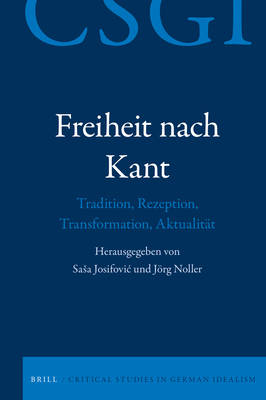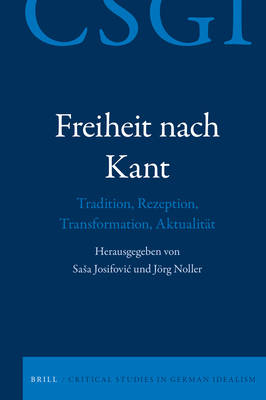
- Afhalen na 1 uur in een winkel met voorraad
- Gratis thuislevering in België vanaf € 30
- Ruim aanbod met 7 miljoen producten
- Afhalen na 1 uur in een winkel met voorraad
- Gratis thuislevering in België vanaf € 30
- Ruim aanbod met 7 miljoen producten
Zoeken
Freiheit Nach Kant
Tradition, Rezeption, Transformation, Aktualität
€ 363,45
+ 726 punten
Omschrijving
Kant's conception of freedom is of special importance in the history of philosophy. It not only brings together older traditions but has great influence on later theories of freedom. The edited volume analyzes Kant's theory, referring to the concepts of will, choice, autonomy, and reason. It consists of four parts: Kant's theory in its historical context; Kant's own conception as developed in his various philosophical works; central conceptions of freedom in German Idealism after Kant (including Reinhold, Schiller, Maimon, Jacobi, Fichte, Schelling, Hegel, Schopenhauer); the systematic relevance of Kant's conception of freedom with regard to recent debates in analytic philosophy (agent causality, compatibilism and incompatibilism).
Specificaties
Betrokkenen
- Uitgeverij:
Inhoud
- Aantal bladzijden:
- 380
- Taal:
- Duits
- Reeks:
- Reeksnummer:
- nr. 22
Eigenschappen
- Productcode (EAN):
- 9789004383579
- Verschijningsdatum:
- 11/10/2018
- Uitvoering:
- Hardcover
- Formaat:
- Genaaid
- Afmetingen:
- 157 mm x 236 mm
- Gewicht:
- 657 g

Alleen bij Standaard Boekhandel
+ 726 punten op je klantenkaart van Standaard Boekhandel
Beoordelingen
We publiceren alleen reviews die voldoen aan de voorwaarden voor reviews. Bekijk onze voorwaarden voor reviews.







